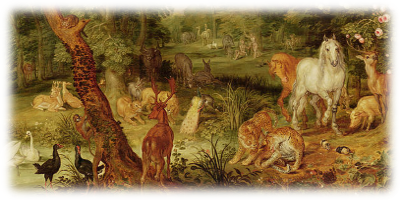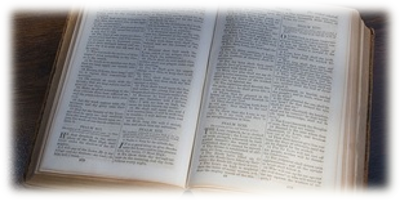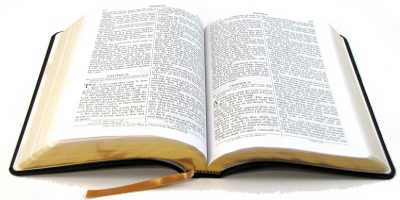When we read Genesis chapter one, we usually see only one story there, but there are actually many stories. Why don't we see these multiple stories? Because we read the Hebrew Bible from a Modern Western thinker's point of view and not from an Ancient Eastern thinker's view like the Hebrews who wrote it. The Hebrews style of writing is prolific with a style of poetry unfamiliar to most readers of the Bible. This poetry is nothing like the poetry we are used to reading today and therefore it is invisible to us.
Often, we overlook what the Bible is telling us because we are not recognizing what the poetry of a passage is attempting to convey. For example, look at Psalms 40:8; "I desire to do your will, O my God; your Torah is within my heart" Here we see that doing the will of God is the same thing as having the Torah within your heart.
It must be remembered that modern western thinkers view events in step logic. This is the idea that each event comes after the previous forming a series of events in a linear timeline. But the Hebrews did not think in step logic but in block logic. This is the grouping together of similar ideas together and not in chronological order. Most people read Genesis chapter one from a step logic perspective or chronological, rather than from the block logic so prevalent in Hebrew poetry.
Now let us look at the Creation story Parallels of Genesis chapter one.
Creation Story Number 1
The first story is found in Genesis 1.1 "In the beginning God created the heavens and the earth." The Hebrew word "bara" is a verb and is usually translated as "create". To really understand what this word means let us look at another passage where this word is used.
1 Samuel 2.29 - Why do you scorn my sacrifice and offering that I prescribed for my dwelling? Why do you honor your sons more than me by fattening yourselves on the choice parts of every offering made by my people Israel?' The word "fattening" in the passage above is the Hebrew word "bara". The noun form of this verb is beriya and can be found in Genesis 41.4 - "And the cows that were ugly and gaunt ate up the seven sleek, fat cows." The word "fat" is the Hebrew word beriya.
The word bara does not mean, "create" (Hebrew actually has no word that means "create" in the sense of something out of nothing) but "to fatten". If we take the literal definition of "bara" in Genesis 1.1 we have - In the beginning God fattened the heavens and the earth. What does this fattening of the heavens and earth mean? This verse is not showing the creation of the heaven and earth, but rather the fattening or filling up of it. Therefore, Genesis 1.1 is a condensed version of the whole creation story.
Creation Story Number 2
The second creation story paralleling Genesis 1.1 is Genesis 1.2 - "and the earth was unfilled and empty and darkness was over the face of the deep, and the Wind of God was hovering over the waters." In this passage we see that the earth was formless and empty before it was filled up, then the Wind of God hovers over the waters of the earth. This hovering would be the action of the Wind of God filling up the earth.
The use of the word "and" at the beginning of this verse may cause some confusion due to an understanding of how this word is used in Hebrew. In English the word "and" in between verses one and two means that what happens in verse two occurs after what happens in verse one. In Hebrew, the word "and" is used in standard Hebrew poetry to link two statements as one. In other words, verse one is the same thing as verse two.
Creation Story Number 3
The third story is found in Genesis 1.3-5. "And God said, 'Let there be light', and there was light and God saw that the light was good and he separated the light from the darkness and God called the light 'day', and the darkness he called 'night' and there was evening, and there was morning, the first day".
Hebrew, like English, has a word for one and a different word for first. The same is true for the words two and second, three and third, etc. As an example, the Hebrew word for "three" is shelosh, and the Hebrew word for "third" is sheliyshiy. Days 2 - 7 use the Hebrew word for second, third, fourth, etc. We would assume that the "first" day would use the Hebrew word reshon meaning "first" in order to be consistent with the other six days, but instead we have the word ehhad meaning "one" or " in unity". The author is making a parallel with the "first" day and with all the days of creation. I believe this is because all seven days of the fattening of the earth are being united in this verse. The first day of creation is also a parallel with the whole of creation as the earth was in darkness and the act of filling the earth brought light to the earth.
Creation Story Number 4
The fourth creation story is found in Genesis 1.3-13. In these passages we have the first three days of creation. These are the days of separating. On the first day God separated light and darkness. On the second day God separated the waters above from the waters below forming the sky and the seas. On the third day God separated the land from the water forming dry land.
Creation Story Number 5
The fifth creation story is found in Genesis 1.14-31. In these passages we have the second set of three days of creation. On the fourth day God filled the light with the sun and the darkness with the moon and stars. On the fifth day God filled the sky with the birds and the sea with the fish. On the sixth day God filled the dry land with the animals and man. Notice the correlation between the first set of three days of separation with the second set of three days of filling.
Creation Story Number 6
The sixth story is the whole of Genesis chapter one. Though we have looked at five different stories of creation, they are all combined together to form one complete story of creation.
Like what you’re discovering? Continue the journey from Bible reader to translator.
|






